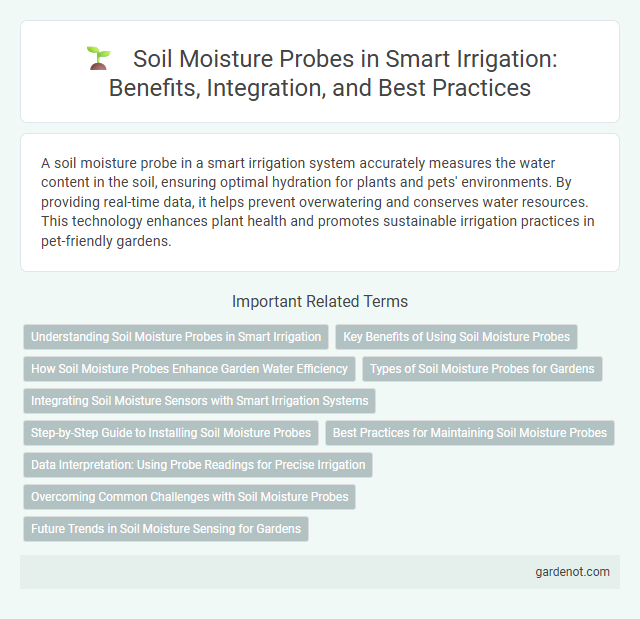A soil moisture probe in a smart irrigation system accurately measures the water content in the soil, ensuring optimal hydration for plants and pets' environments. By providing real-time data, it helps prevent overwatering and conserves water resources. This technology enhances plant health and promotes sustainable irrigation practices in pet-friendly gardens.
Understanding Soil Moisture Probes in Smart Irrigation
Soil moisture probes are essential components in smart irrigation systems, providing real-time data on soil water content to optimize watering schedules. These sensors measure the volumetric water content by detecting changes in electrical resistance or dielectric permittivity within the soil. Accurate soil moisture monitoring reduces water waste, promotes plant health, and enhances resource efficiency in precision agriculture.
Key Benefits of Using Soil Moisture Probes
Soil moisture probes provide precise real-time data on soil water content, enabling efficient water usage and reducing waste in smart irrigation systems. These probes help optimize crop health by preventing both overwatering and underwatering, leading to improved yield and resource conservation. Integration with automated irrigation controllers ensures timely irrigation based on accurate soil conditions, promoting sustainable agricultural practices.
How Soil Moisture Probes Enhance Garden Water Efficiency
Soil moisture probes provide precise, real-time data on soil water content, enabling targeted irrigation that reduces water waste and promotes plant health. By accurately measuring moisture levels at various soil depths, these probes help optimize watering schedules and prevent overwatering or underwatering. Implementing soil moisture probes in smart irrigation systems leads to significant water savings and improved garden productivity.
Types of Soil Moisture Probes for Gardens
Soil moisture probes for gardens include capacitance, tensiometer, and gypsum block types, each offering unique measurement methods for soil water content. Capacitance probes use dielectric permittivity to provide rapid and accurate moisture readings, ideal for real-time irrigation management. Tensiometers measure soil water tension, while gypsum blocks assess electrical resistance, both valuable for understanding soil moisture availability but requiring more maintenance than capacitance types.
Integrating Soil Moisture Sensors with Smart Irrigation Systems
Integrating soil moisture sensors with smart irrigation systems enables precise water management by continuously monitoring soil hydration levels and triggering irrigation only when necessary. These sensors provide real-time data that optimizes water usage, reduces waste, and promotes healthier crop growth by maintaining ideal moisture conditions. Advanced soil moisture probes can be calibrated for different soil types, ensuring accurate measurements and efficient irrigation scheduling tailored to specific agricultural needs.
Step-by-Step Guide to Installing Soil Moisture Probes
Begin by selecting a representative location in the field and inserting the soil moisture probe vertically at the root zone depth, typically 6 to 12 inches below the surface, to ensure accurate moisture readings. Secure the probe in place, connect it to the irrigation control system or data logger, and calibrate the device according to manufacturer specifications for the specific soil type. Regularly monitor soil moisture data to optimize watering schedules, reduce water waste, and enhance crop health.
Best Practices for Maintaining Soil Moisture Probes
Regular calibration of soil moisture probes ensures accurate readings critical for efficient smart irrigation management. Protecting probes from physical damage and cleaning sensor surfaces periodically prevents data inconsistencies caused by soil buildup or corrosion. Storing probes properly during off-seasons and checking battery or signal strength maintains long-term functionality and reliable soil moisture monitoring.
Data Interpretation: Using Probe Readings for Precise Irrigation
Soil moisture probes provide accurate data on moisture levels by measuring the volumetric water content in the root zone, enabling precise irrigation scheduling. Interpreting these readings allows for optimal water application, reducing wastage and preventing plant stress caused by under- or over-watering. Integrating soil moisture data with automated irrigation systems enhances crop yield and conserves water resources efficiently.
Overcoming Common Challenges with Soil Moisture Probes
Soil moisture probes face challenges such as inaccurate readings caused by soil heterogeneity and probe calibration issues. Employing advanced sensor technology combined with regular calibration and strategic probe placement improves data accuracy and irrigation efficiency. Integrating real-time moisture data with smart irrigation systems enables precise water management, reducing wastage and optimizing crop yield.
Future Trends in Soil Moisture Sensing for Gardens
Advancements in soil moisture probes are set to integrate AI-driven analytics and IoT connectivity, enabling real-time data processing and precise water application in garden irrigation systems. Emerging sensor technologies incorporate nanomaterials and energy-harvesting mechanisms to offer enhanced sensitivity and sustainability. These innovations promise to optimize water efficiency, reduce resource waste, and support smart garden ecosystems through predictive moisture management.
Soil moisture probe Infographic

 gardenot.com
gardenot.com